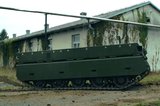Fourth European country opts for Euro PULS rocket artillery system as Germany signs up
Euro PULS integrated onto the rear of Tatra (6x6) truck showing two of the different rocket pods available. Note that the stabilisers are not lowered. (Photo: Elbit Systems)
Elbit Systems will provide Germany with Euro PULS (Precise & Universal Launching System) artillery rocket launchers under an initial contract announced on 6 Febraury and worth US$57 million.
The Israeli company beat out Germany’s Rheinmetall which had teamed with Lockheed Martin to offer the US company’s Global Mobile Artillery Rocket System installed on a Rheinmetall MAN Military Vehicles HX (8x8) series platform.
The Euro PULS order is being carried out through agreements between the German, Netherlands and Israeli governments and in collaboration with KNDS-Germany which has previously upgraded some of the German Army’s M270 MLRS.
Under the terms of
Already have an account? Log in
Want to keep reading this article?
More from Land Warfare
-
![Active vehicle protection comes to the forefront as Trophy and Iron Fist secure contracts]()
Active vehicle protection comes to the forefront as Trophy and Iron Fist secure contracts
Experience on the battlefield is accelerating the adoption of active protection systems as technologies continue to evolve to reflect shifting global defence needs.
-
![World Defense Show 2026: Hanwha increases Middle East presence and reveals Tigon 6x6 sale]()
World Defense Show 2026: Hanwha increases Middle East presence and reveals Tigon 6x6 sale
Shephard sat down with Hanwha Middle East and Africa president Sung Il at World Defense Show 2026 to hear about the company’s plans for the region and how it plans to use local industry success to win deals.
-
![Estonia builds Asia-Pacific links as it looks to scale defence industry capabilities]()
Estonia builds Asia-Pacific links as it looks to scale defence industry capabilities
Collaboration between Estonian defence companies and well-aligned firms in Asia-Pacific will form a key part of Tallinn’s ambitions to significantly grow its defence industrial base.
-
![World Defense Show 2026: DOK-ING working on MV-8 variants and reveals specs ahead of Eurosatory]()
World Defense Show 2026: DOK-ING working on MV-8 variants and reveals specs ahead of Eurosatory
The Croatian company began the development of the MV-8 modular uncrewed platform in the early 2020s. Specifications for the vehicle were revealed to Shephard at World Defense Show 2026.
-
![World Defense Show 2026: Turkish and European industries will cooperate, says Aselsan boss]()
World Defense Show 2026: Turkish and European industries will cooperate, says Aselsan boss
Aselsan was formed 50 years ago in response to difficulties Turkey was facing in sourcing major systems internationally. While some challenges still remain, company president Ahmet Akyol believes a rapprochement is possible.























